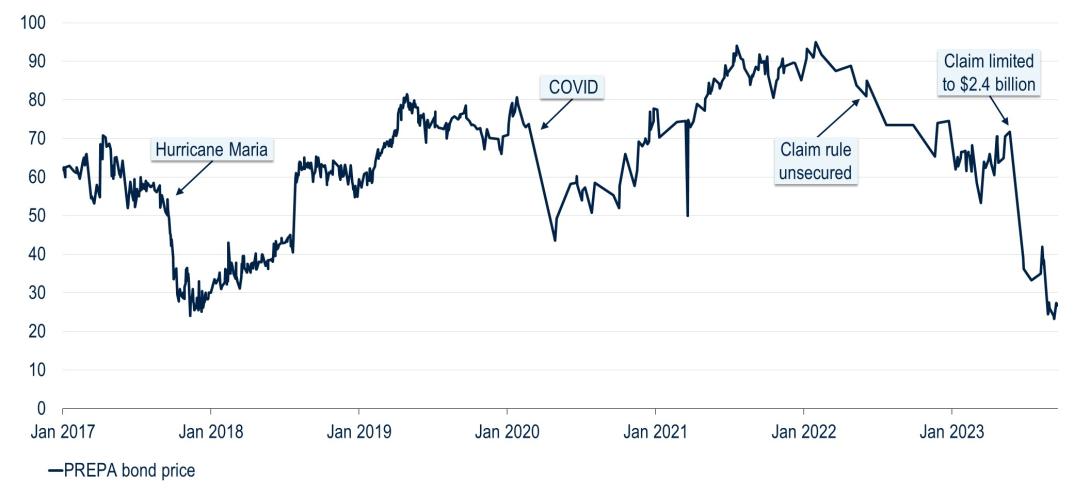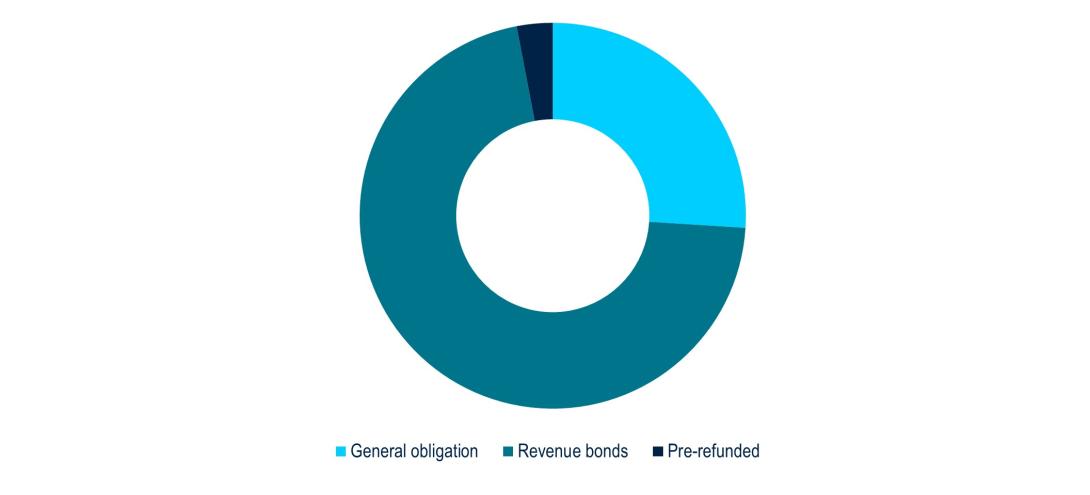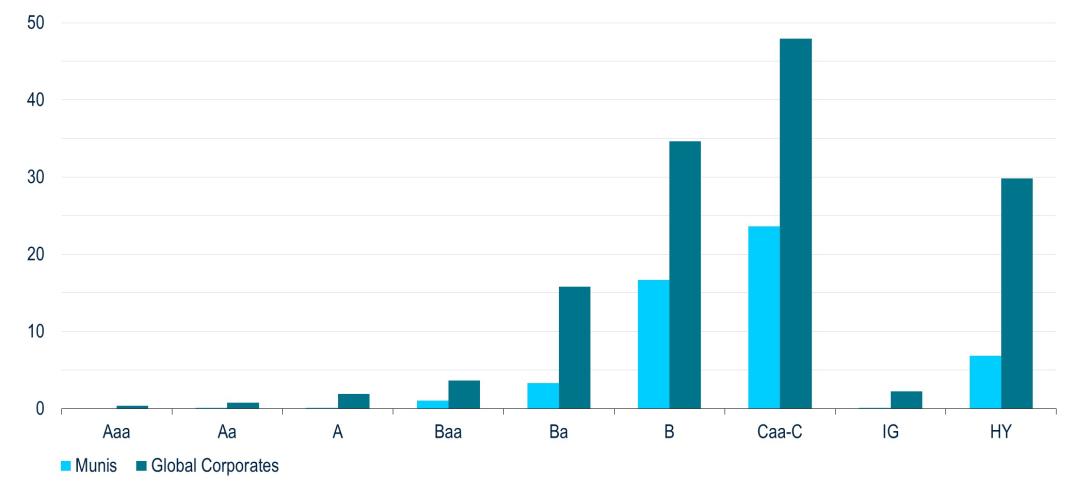PREPA Restructuring Unlikely to Dim the Outlook for Revenue Bonds

Puerto Rico’s Electric Authority (PREPA), a government-owned utility, filed for bankruptcy in 2017 with approximately $8.4 billion of revenue debt. In August 2023, the federally appointed oversight board filed a proposed third amended Plan of Adjustment (POA) outlining a very low recovery for the utility’s debt. The basis for the low recovery is partially driven by several unfavorable court rulings, which some market watchers believe cast doubt on the strength of municipal revenue bonds. While we believe the outcome in PREPA is unlikely to dim the prospects for revenue bonds, the case serves as a reminder that investors cannot passively assume that all revenue bonds are equal.
PREPA Recovery Proposal
Puerto Rico’s long-standing bankruptcy is approaching a conclusion as PREPA remains the only major debtor on the island still negotiating with creditors in Title III bankruptcy. PREPA bonds have recently traded around 25 cents on the dollar (Figure 1)—a level we believe is unjustified given the expected lower recovery for bondholders. The POA outlined a 12.5% recovery for PREPA consenting bondholders and a 3.5% recovery for non-consenting bondholders. The plan also includes a Contingent Value Instrument, although this feature is expected to provide only a marginal increase to the recovery rate. In a sector where bankruptcies are exceedingly rare, the recovery rates also appeared surprisingly low.
Figure 1: PREPA Bonds Trade Lower Following Adverse Rulings

Source: Bloomberg, September 2023.
During the pendency of PREPA’s Title III bankruptcy, the judge rendered several highly technical decisions that were detrimental to bondholders and contributed to the low recoveries in the POA. In one decision, the judge classified bondholders’ lien on PREPA’s revenues as unsecured and then, in a subsequent decision, limited bondholders’ unsecured claim to $2.38 billion, or approximately 28% of bonds outstanding. The situation serves as a reminder of the nuances that can emerge in corners of the municipal bond market and require thorough analysis of the offering documentation.
Bond documents for a typical municipal revenue bond establish the source of revenues to repay the bonds and place a secured lien upon and/or pledge of the identified revenue source. Some investors specifically seek out revenue bonds, as opposed to general obligation municipal bonds, because of these attributes.
Unfortunately, the language in the PREPA documents is ambiguous. The security section of the PREPA Official Statement, as an example, states that bonds are deemed payable from utility revenues. However, that language and similar statements in the bond indenture failed, in the eyes of the court, to adequately grant a secured interest in the utility revenues. While the PREPA bond documents include a sinking fund deposit covenant and a rate covenant, there is a strong precedent that covenants are not enforceable in bankruptcy.
The latest POA has support from over 40% of bondholders, but there are several large holders that are appealing the judge’s decisions. Plan confirmation hearings are not scheduled until March 2024, and there is a chance that objecting bondholders succeed with all, or part, of their appeals, or that the POA is once again re-negotiated.
Revenue Bonds Here to Stay
Revenue bonds comprise nearly 70% of the municipal bond market (Figure 2). The category includes a variety of issuers representing sectors such as transportation, healthcare and education entities, and essential service utilities, such as water and sewer and electric utilities.
Figure 2: Barclays Municipal Bond Index (%)

Source: Bloomberg, October 2023.
Revenue bonds issued by municipalities typically benefit from a “special revenue” designation under Chapter 9 of the bankruptcy code. This designation was added to the bankruptcy code in 1988 to ensure that revenues pledged to pay bonds used to finance critical U.S. infrastructure assets would remain subject to any lien granted prior to commencement of a debtor’s bankruptcy and continue post-petition. But because language in the PREPA documents did not adequately establish a lien on revenues, the protections provided by the special revenue designation did not apply. The judge’s unfamiliarity with the concept of special revenues may have also contributed to her rulings.
However, it would be incorrect for investors to infer from the Puerto Rico rulings that all revenue bonds are now weaker than they were previously. We remind investors that despite frequent doom-and-gloom headlines, municipal defaults remain rare, especially relative to corporate defaults (Figure 3).
Figure 3: Municipal Defaults vs. Corporate Defaults (%)

Source: Moody's Investors Service.
In addition, several municipal bankruptcies have provided precedent for the preservation of special revenues. In the Jefferson County bankruptcy cases, for example, water and sewer revenue bonds were not impaired. Additionally, in Detroit’s high-profile bankruptcy, the payment of principal and interest on the city’s essential service water and sewer bonds was uninterrupted.
Conclusion
Revenue bonds benefit from security features that ensure a state and local government’s continued access to financing for critical infrastructure. The PREPA ruling is largely the result of ambiguous language in the original PREPA bond documents and should have little impact on the market’s confidence in the strength of the wider universe of revenue bonds.
Yet, the situation should remind investors of the need to carefully review a revenue bond’s security provisions to gain comfort that the designation would likely apply if the borrower were to become distressed. While special revenues should prevail in the future, the PREPA case underscores that idiosyncrasies can exist in a nuanced sector which requires thorough credit analysis.
Read More From PGIM Fixed Income
The comments, opinions, and estimates contained herein are based on and/or derived from publicly available information from sources that PGIM Fixed Income believes to be reliable. We do not guarantee the accuracy of such sources or information. This outlook, which is for informational purposes only, sets forth our views as of this date. The underlying assumptions and our views are subject to change. Past performance is not a guarantee or a reliable indicator of future results.
Source(s) of data (unless otherwise noted): PGIM Fixed Income, as of 10/19/2023.
For Professional Investors only. Past performance is not a guarantee or a reliable indicator of future results and an investment could lose value. All investments involve risk, including the possible loss of capital.
PGIM Fixed Income operates primarily through PGIM, Inc., a registered investment adviser under the U.S. Investment Advisers Act of 1940, as amended, and a Prudential Financial, Inc. (“PFI”) company. Registration as a registered investment adviser does not imply a certain level or skill or training. PGIM Fixed Income is headquartered in Newark, New Jersey and also includes the following businesses globally: (i) the public fixed income unit within PGIM Limited, located in London; (ii) PGIM Netherlands B.V., located in Amsterdam; (iii) PGIM Japan Co., Ltd. (“PGIM Japan”), located in Tokyo; (iv) the public fixed income unit within PGIM (Hong Kong) Ltd. located in Hong Kong; and (v) the public fixed income unit within PGIM (Singapore) Pte. Ltd., located in Singapore (“PGIM Singapore”). PFI of the United States is not affiliated in any manner with Prudential plc, incorporated in the United Kingdom or with Prudential Assurance Company, a subsidiary of M&G plc, incorporated in the United Kingdom. Prudential, PGIM, their respective logos, and the Rock symbol are service marks of PFI and its related entities, registered in many jurisdictions worldwide.
These materials are for informational or educational purposes only. The information is not intended as investment advice and is not a recommendation about managing or investing assets. In providing these materials, PGIM is not acting as your fiduciary. PGIM Fixed Income as a general matter provides services to qualified institutions, financial intermediaries and institutional investors. Investors seeking information regarding their particular investment needs should contact their own financial professional.
These materials represent the views and opinions of the author(s) regarding the economic conditions, asset classes, securities, issuers or financial instruments referenced herein. Distribution of this information to any person other than the person to whom it was originally delivered and to such person’s advisers is unauthorized, and any reproduction of these materials, in whole or in part, or the divulgence of any of the contents hereof, without prior consent of PGIM Fixed Income is prohibited. Certain information contained herein has been obtained from sources that PGIM Fixed Income believes to be reliable as of the date presented; however, PGIM Fixed Income cannot guarantee the accuracy of such information, assure its completeness, or warrant such information will not be changed. The information contained herein is current as of the date of issuance (or such earlier date as referenced herein) and is subject to change without notice. PGIM Fixed Income has no obligation to update any or all of such information; nor do we make any express or implied warranties or representations as to the completeness or accuracy.
Any forecasts, estimates and certain information contained herein are based upon proprietary research and should not be interpreted as investment advice, as an offer or solicitation, nor as the purchase or sale of any financial instrument. Forecasts and estimates have certain inherent limitations, and unlike an actual performance record, do not reflect actual trading, liquidity constraints, fee. These materials are not intended as an offer or solicitation with respect to the purchase or sale of any security or other financial instrument or any investment management services and should not be used as the basis for any investment decision. PGIM Fixed Income and its affiliates may make investment decisions that are inconsistent with the recommendations or views expressed herein, including for proprietary accounts of PGIM Fixed Income or its affiliates.
Investing in the bond market is subject to risks, including market, interest rate, issuer, credit, inflation risk, and liquidity risk. The value of most bonds and bond strategies are impacted by changes in interest rates. Bonds and bond strategies with longer durations tend to be more sensitive and volatile than those with shorter durations; bond prices generally fall as interest rates rise, and low interest rate environments increase this risk. Reductions in bond counterparty capacity may contribute to decreased market liquidity and increased price volatility. Bond investments may be worth more or less than the original cost when redeemed. Mortgage- and asset-backed securities may be sensitive to changes in interest rates, subject to early repayment risk, and while generally supported by a government, government agency or private guarantor, there is no assurance that the guarantor will meet its obligations. High yield, lower-rated securities involve greater risk than higher-rated securities; portfolios that invest in them may be subject to greater levels of credit and liquidity risk than portfolios that do not. Investing in foreign-denominated and/or -domiciled securities may involve heightened risk due to currency fluctuations, and economic and political risks, which may be enhanced in emerging markets. Currency rates may fluctuate significantly over short periods of time and may reduce the returns of a portfolio. Commodities contain heightened risk, including market, political, regulatory and natural conditions, and may not be suitable for all investors. Diversification does not ensure against loss.
In the United Kingdom, information is issued by PGIM Limited with registered office: Grand Buildings, 1-3 Strand, Trafalgar Square, London, WC2N 5HR.PGIM Limited is authorised and regulated by the Financial Conduct Authority (“FCA”) of the United Kingdom (Firm Reference Number 193418). In the European Economic Area (“EEA”), information is issued by PGIM Netherlands B.V., an entity authorised by the Autoriteit Financiële Markten (“AFM”) in the Netherlands and operating on the basis of a European passport. In certain EEA countries, information is, where permitted, presented by PGIM Limited in reliance of provisions, exemptions or licenses available to PGIM Limited including those available under temporary permission arrangements following the exit of the United Kingdom from the European Union. These materials are issued by PGIM Limited and/or PGIM Netherlands B.V. to persons who are professional clients as defined under the rules of the FCA and/or to persons who are professional clients as defined in the relevant local implementation of Directive 2014/65/EU (MiFID II). In Switzerland, information is issued by PGIM Limited, London, through its Representative Office in Zurich with registered office: Kappelergasse 14, CH-8001 Zurich, Switzerland. PGIM Limited, London, Representative Office in Zurich is authorised and regulated by the Swiss Financial Market Supervisory Authority FINMA and these materials are issued to persons who are professional or institutional clients within the meaning of Art.4 para 3 and 4 FinSA in Switzerland. In certain countries in Asia-Pacific, information is presented by PGIM (Singapore) Pte. Ltd., a regulated entity with the Monetary Authority of Singapore under a Capital Markets Services License to conduct fund management and an exempt financial adviser. In Japan, information is presented by PGIM Japan Co. Ltd., registered investment adviser with the Japanese Financial Services Agency. In South Korea, information is presented by PGIM, Inc., which is licensed to provide discretionary investment management services directly to South Korean investors. In Hong Kong, information is provided by PGIM (Hong Kong) Limited, a regulated entity with the Securities & Futures Commission in Hong Kong to professional investors as defined in Section 1 of Part 1 of Schedule 1 of the Securities and Futures Ordinance (Cap.571). In Australia, this information is presented by PGIM (Australia) Pty Ltd (“PGIM Australia”) for the general information of its “wholesale” customers (as defined in the Corporations Act 2001). PGIM Australia is a representative of PGIM Limited, which is exempt from the requirement to hold an Australian Financial Services License under the Australian Corporations Act 2001 in respect of financial services. PGIM Limited is exempt by virtue of its regulation by the FCA (Reg: 193418) under the laws of the United Kingdom and the application of ASIC Class Order 03/1099. The laws of the United Kingdom differ from Australian laws. In Canada, pursuant to the international adviser registration exemption in National Instrument 31-103, PGIM, Inc. is informing you that: (1) PGIM, Inc. is not registered in Canada and is advising you in reliance upon an exemption from the adviser registration requirement under National Instrument 31-103; (2) PGIM, Inc.’s jurisdiction of residence is New Jersey, U.S.A.; (3) there may be difficulty enforcing legal rights against PGIM, Inc. because it is resident outside of Canada and all or substantially all of its assets may be situated outside of Canada; and (4) the name and address of the agent for service of process of PGIM, Inc. in the applicable Provinces of Canada are as follows: in Québec: Borden Ladner Gervais LLP, 1000 de La Gauchetière Street West, Suite 900 Montréal, QC H3B 5H4; in British Columbia: Borden Ladner Gervais LLP, 1200 Waterfront Centre, 200 Burrard Street, Vancouver, BC V7X 1T2; in Ontario: Borden Ladner Gervais LLP, 22 Adelaide Street West, Suite 3400, Toronto, ON M5H 4E3; in Nova Scotia: Cox & Palmer, Q.C., 1100 Purdy’s Wharf Tower One, 1959 Upper Water Street, P.O. Box 2380 -Stn Central RPO, Halifax, NS B3J 3E5; in Alberta: Borden Ladner Gervais LLP, 530 Third Avenue S.W., Calgary, AB T2P R3.
© 2023 PFI and its related entities.
2023-7795
Sign Up Now for Full Access to Articles and Podcasts!
Unlock full access to our vast content library by registering as an institutional investor .
Create an accountAlready have an account ? Sign in
